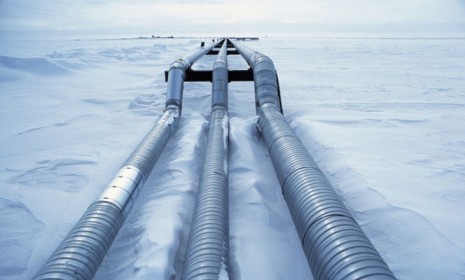BP's new oil spill in Alaska: 'Reckless'?
The beleaguered company that was pummeled over its massive Gulf oil disaster is grappling with another (arguably preventable) spill

A free daily email with the biggest news stories of the day – and the best features from TheWeek.com
You are now subscribed
Your newsletter sign-up was successful
BP, the petroleum giant responsible for last year's massive oil spill in the Gulf of Mexico, is under scrutiny for yet another spill, this time in Alaska. The latest mishap is one more stain on a company that's struggling to polish its reputation after the April 2010 disaster, which was the worst spill in U.S. history. Here, a brief guide to the latest spill:
What exactly happened in Alaska?
On Saturday, an 8-inch pipeline in BP's Lisburne oil field — near Alaska's Prudhoe Bay — was being pressure-tested when the pipe burst, releasing crude oil, methanol, and water across a gravel pad and into a small pond. Buildings nearby shook from the force of the rupture, and heavy winds blew the oily mixture across roughly 7,000 square feet of tundra and gravel.
The Week
Escape your echo chamber. Get the facts behind the news, plus analysis from multiple perspectives.

Sign up for The Week's Free Newsletters
From our morning news briefing to a weekly Good News Newsletter, get the best of The Week delivered directly to your inbox.
From our morning news briefing to a weekly Good News Newsletter, get the best of The Week delivered directly to your inbox.
How bad is the spill?
This latest oil spill "is no Gulf spill, to be sure," says Brain Merchant at Treehugger. Somewhere between 2,100 and 4,200 gallons of pollutants were released into the environment in Alaska. By comparison, last year's Gulf oil spill released about 5 million gallons of crude oil. "But it's a reminder that where companies drill and transport oil — especially notoriously reckless companies like BP — that oil has a habit of spilling."
What is the company doing to clean up?
BP brought in Alaska Clean Seas, an environmental management firm, to help with the cleanup process. By Sunday, roughly 15 barrels, or more than 600 gallons, of contaminated methanol and oily water had been recovered from the site, according to the Alaska Department of Environmental Conservation. "BP has got a goal to have the investigation completed and the line repaired by fall freeze-up," says Tom DeRuyter, a state environmental official, as quoted by Reuters.
A free daily email with the biggest news stories of the day – and the best features from TheWeek.com
Could this spill have been prevented?
There's some compelling evidence that BP could have foreseen problems at this facility. A 2010 investigation by ProPublica revealed that 148 sections of BP pipeline in Alaska (but not the one that burst) were so corroded that they were in imminent danger of rupture. Internal records showed that these pipelines had worn so thin — in some cases as thin as a few thousandths of an inch — that they should be operated only under reduced pressure. The investigation also found that regular maintenance of BP's pipelines and facilities throughout Alaska had been neglected for more than a decade, due to a company-wide effort to reduce operating costs.
Is BP's safety record worse than its competitors'?
All oil companies have occasional accidents or other problems, as evidenced by Exxon's recent oil spill in the Yellowstone River. But BP seems to be particularly accident-prone. Earlier this year, another pipeline operated by BP ruptured in Alaska, forcing a shutdown of the Prudhoe Bay field and causing oil prices to rise by about $2 in January. In May, BP agreed to pay $85 million in fines and penalties in connection with a 2006 spill of more than 5,000 barrels of oil in Alaska's North Slope. A 2005 explosion at a BP refinery in Texas City, Texas, killed 15 people and injured 170 more. "You’d think that by now," says Steve Gelsi in MarketWatch.com, "their turn in the hot seat would be up, but they keep getting dragged back in."
Sources: Anchorage Daily News, MarketWatch, ProPublica, Reuters, The Telegraph, Treehugger
Editor's Note: This article originally misstated which sections of BP pipeline in Alaska had been identified as being in imminent danger of rupture. The original ProPublica story from which these facts were drawn has since been corrected, and this article has been revised accordingly. We regret the error.